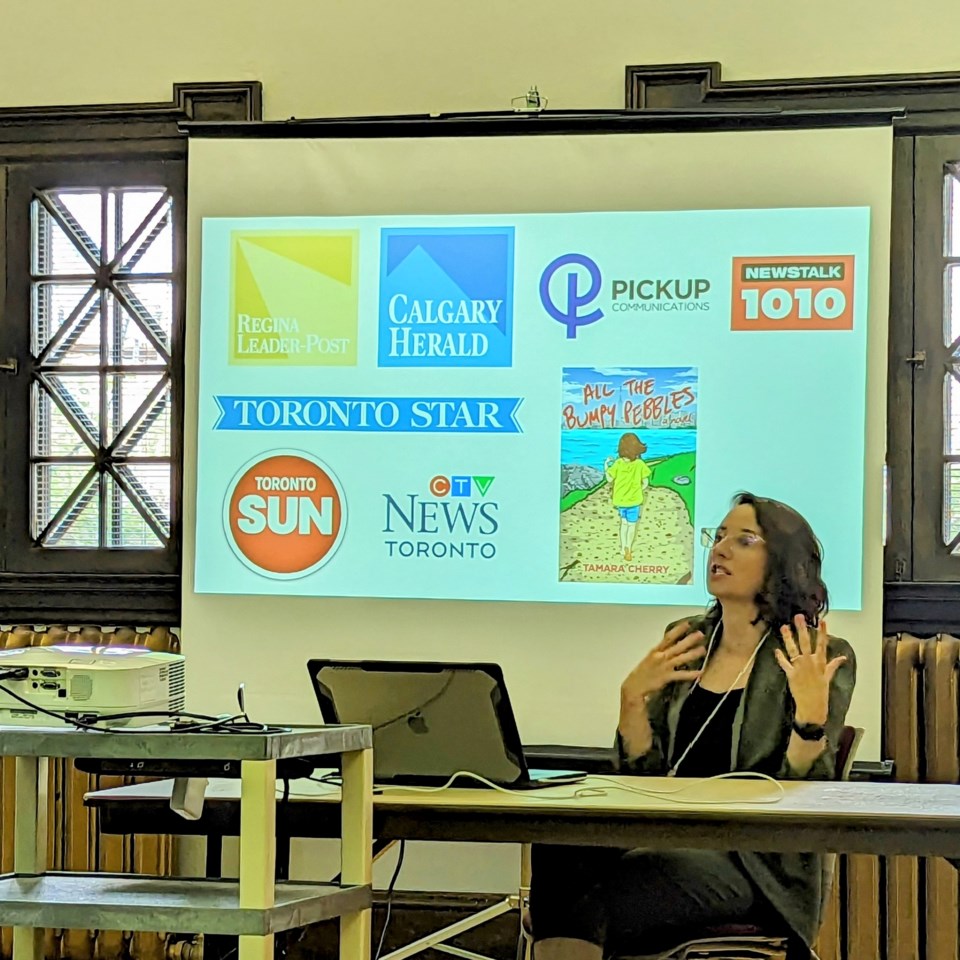Tamara Cherry is a Regina-based award-winning journalist, author, researcher, and communications consultant who spent nearly 15 years as a crime reporter for the Toronto Star, Toronto Sun, and CTV News Toronto.
Her latest book, The Trauma Beat: A Case for Re-Thinking the Business of Bad News (2023), examines the impact of media reporting on trauma survivors. Cherry also takes a close look at the impact of trauma reporting on members of the media themselves.
On July 13, Cherry gave a presentation of her work during a workshop at the Moose Jaw Public Library, as part of the 2023 Saskatchewan Festival of Words.
Cherry’s career in crime reporting
“My first reporting gig came right down the No. 1 during an internship with the Regina Leader-Post,” Cherry told workshop participants. “My first week on the job, I interviewed a woman whose father died from Alzheimer’s. And I was taken aback when she started crying during the interview.
“In the end, she was crying, I was crying, and that was the story, like, three days into my journalism career, that made me fall in love with telling stories that can make people feel something, or make people care.”
Cherry went on to the Calgary Herald, where she interviewed a newly widowed woman and had to take a break because she was close to tears — only to find out someone else from a different department had also interviewed. The woman had had to go through the experience twice with one publication, and Cherry’s interview would not even be used.
“I’d been tasked with interviewing her for nothing,” Cherry said. “‘What the f***?’ is what I later wrote in my journal. I was 20 years old and had never been taught anything about trauma, about interviewing trauma survivors — nothing.”
Cherry went on to a distinguished, respected career as, of all things, a crime reporter. She loved the rush, she said, and seemed to have a knack for it.
“I think it was rooted in my love of telling very authentic stories that can make people feel something.”
She developed a niche for herself in domestic sex trafficking, and wrote hundreds of stories on the subject, conducting countless interviews.
As she says in her book, Cherry did not understand the harm and the impact that her aggressive approach to stories had on survivors. She also developed post-traumatic stress, often waking in cold sweats from nightmares and struggling with her closest relationships.
“I have no idea how many hundreds of trauma survivors I interviewed in nearly a decade on television,” Cherry said. “But the stories are etched into my brain.”
What can journalists do better?
In 2019, Cherry switched careers to found Pickup Communications. The company is a public relations firm focused on supporting trauma survivors and those surrounding them. It has also evolved to provide training for those whose jobs frequently involved interacting with trauma survivors.
In 2020, she conducted research in which she interviewed over 100 survivors of homicide and traffic fatalities, sexual assault and human trafficking, family members of missing people, and survivors of mass violence. She also interviewed more than two dozen journalists.
That research resulted in a well-regarded peer-reviewed paper: Trauma survivors and the media: A qualitative analysis, her book, and a catalogue of training materials specialized for service providers, journalists, homicide investigators, and more.
“What I didn’t realize until this research project is that practicing trauma-informed journalism, and long-form storytelling, is not only necessary to protect the survivors you’re writing about, it is necessary to protect yourself.”
Cherry now advocates for trauma-informed training for reporters. Part of that is taking more responsibility for the well-being of interviewees.
“When it comes to stories about trauma, it’s just different,” Cherry said with heavy emphasis. “We as storytellers cannot apply the same rules to these stories as we do to others.”
Although she believes everyone should have the benefit of formal training, Cherry suggested a few ways journalists can do better with traumatic stories without any training at all:
- Give survivors more agency, such as giving them the option to refuse interviews, take a break during an interview, or see the interview before it is published.
- Be compassionate, rather than assuming a façade of professional separation that, in the end, helps neither person. Consider an interview location the interviewee can be comfortable in and ask if there is someone who could support them through it.
- Ask survivors if there is a particular message they want to see in their story, such as telling trafficking survivors that there is hope and help.
- Follow up: Reach out after the story is published to see how it affected them. Have the conversation and recognize the significance of turning possibly the worst experience of a person’s life into a story for mass consumption.
“I truly believe,” Cherry said,” that if we all understood more about trauma in general, our world would be a much better place — more compassionate, more patient, and safer.”




